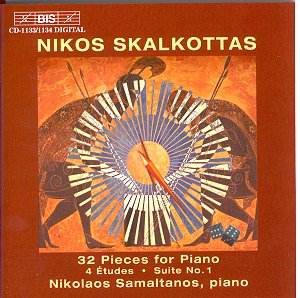Nikos SKALKOTTAS (1904-49)
Thirty-Two pieces for piano (1940)
Four etudes (1941)
Suite no 1 (1936)
 Nikolaos Samaltanos
(piano)
Nikolaos Samaltanos
(piano)
rec 1998-2000 at Eglise Saint-Marcel, Paris
 BIS CD 1133/34
2CD [119.22]
BIS CD 1133/34
2CD [119.22]
Crotchet
AmazonUK AmazonUS

I have played (some of) the Thirty-Two Pieces for many years and remain astounded
by their neglect. I have cassettes of their broadcast by Geoffrey Douglas
Madge (who has a valuable Wolpe collection on CD - CPO 999 055-2) but only
the 15 Little Variations (1927 - promised in a third disc to follow) seem
to get played at all often. They are not too hard, nor are some of the Thirty-Two
Pieces, but others of those require transcendental pianism and should be
taken up by our Rolf Hinds and Ian Paces and their virtuosic colleagues.
Nikos Skalkottas (1904-49) has long been a particular favourite composer
of mine:-
1.SKALKOTTAS
Violin Music
2.
SKALKOTTAS
The Maiden and Death; Piano Concerto No 1
3.
SKALKOTTAS
String Quartets nos 3 4
He is notable for the wit and Mediterranean warmth he brings to his individual
treatment of what he learned from Schönberg. He uses a 12-note system
of his own and veers between free atonality to multi-serialism, but not eschewing
tonal, modal and jazz ingredients. His chords are colourful and the music
is characterised by enormous energy and rhythmic subtlety and repays studying
at the keyboard (I have Universal 12792, 12958 & 12370). The Thirty-Two
Pieces (1940) are exhilarating and even draining to hear straight through,
such is their intensity, and the break between the discs comes at just the
right moment. They last 95 mins and are intended to be performed as a whole.
Their variety is limitless, from baroque passacaglia to tango and jazz. They
represent one of the great piano cycles of the century which should take
its place alongside those of Albeniz, Shostakovich, Messiaen, Stockhausen
and
Finnissy.
This then is an essential purchase, a recording which is 60 years overdue.
The texts have been specially reworked and edited, and there are detailed
liner notes, which also summarise the composer's isolated and tragic life,
dying unknown in 1949, unpublished, unrecorded and unplayed. I found little
interest in Skalkottas in conversation during a recent visit to Greece for
a music
festival.
Nikolaos Samaltanos's playing, recorded in a church, is dedicated and impressive,
but not necessarily the last word on this music. I would have preferred greater
clarity and was not sure about the toning of the Steinway, which seemed to
lack 'bite', but these are minor quibbles which should not deter you from
investigating a landmark release.
Peter Grahame Woolf

